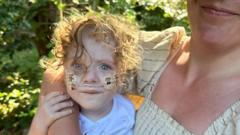Is Your Local Park Leaving Families Heartbroken Over Accessibility?

Published: 2025-09-02 10:40:21 | Category: technology
This article explores the controversy surrounding the new play park at Salisbury River Park in Wiltshire, which has been marketed as an "accessible space" but has left some parents disappointed. A local mother, Rebecca, voiced her frustration after discovering that the facilities do not cater adequately to her daughter Hannah's disabilities, highlighting a gap between the council's claims and the reality of the park's inclusivity.
Last updated: 13 October 2023 (BST)
Key Takeaways
- The new play park opened on 21 August 2023 and has faced criticism for not being truly accessible.
- Rebecca's daughter, Hannah, has cerebral palsy and found no suitable equipment for her needs.
- Salisbury City Council claimed to have consulted with local disability groups to ensure inclusivity.
- Community leaders argue that while the park is great for non-disabled children, it lacks necessary provisions for disabled children.
- Concerns have been raised about the safety and accessibility of certain equipment designed for children with disabilities.
The Opening of the Play Park
The play park at Salisbury River Park was launched with much anticipation, promising to be an inclusive space for children of all abilities. Featuring various play structures such as swings, slides, and climbing equipment, the park aimed to cater to a diverse range of needs. However, the reality has not lived up to the expectations set by the council and community leaders.
Community Reactions
Rebecca, a local mother, expressed her anger and heartbreak after visiting the park. Her daughter, Hannah, aged two, has cerebral palsy and is reliant on a nasal cannula due to her condition. Upon visiting the new facility, Rebecca quickly realised that there was "nothing" her daughter could use, describing the experience as disheartening.
She stated, "It’s not fair to take my daughter into a playing area to watch other children play when she can't play." This sentiment resonates with many parents who feel that the park, while marketed as accessible, does not truly accommodate children with disabilities.
Official Statements and Claims
In defence of the park's design, Council leader Sam Charleston acknowledged that while there had been provisions made for neuro-divergent children, there remains room for improvement. He noted that the park was developed in consultation with the Disability Interest Group of Salisbury (DIGS), aiming to create a space that is genuinely inclusive.
What Does Accessibility Mean?
Accessibility in public spaces is often defined by the availability of equipment and facilities that can be used by individuals with varying needs and disabilities. This can include features like:
- Flat surfacing for wheelchair users
- Specialised swings or slides
- Spaces for parents to assist children safely
- Clear pathways and signage
Despite these intentions, the reality for many families can differ greatly from what is proposed. In this case, it appears that the park has fallen short of its accessibility claims.
Community Leaders Speak Out
Kez Adey, head of DIGS, raised concerns about the park's safety and suitability for disabled children. She pointed out that while the park is fantastic for non-disabled children, the lack of appropriate facilities for those with disabilities undermines the park's intended purpose. She stated, "For non-disabled, non-divergent children, it is absolutely amazing. But for disabled children, neuro-diverse children, this just isn't safe for them."
Specific Concerns Raised
Among the specific issues highlighted by community leaders are:
- The design of the wider slides, which, while intended for parent-child interaction, poses challenges for accessibility.
- The inadequate access points for parents who wish to assist their children on the play equipment.
- The absence of appropriate sensory play options for neuro-divergent children.
These concerns suggest that while the council may have attempted to create an inclusive environment, they may not have fully understood the specific needs of disabled children and their families.
Next Steps for the Community
The controversy surrounding the park's accessibility raises important questions about how local authorities engage with disabled communities in the planning and design stages of public facilities. For many, the focus should shift towards creating spaces that genuinely accommodate all children, not just in theory but in practical application.
For parents like Rebecca, the park's shortcomings are not just an inconvenience; they represent a broader issue of representation and accessibility in community planning. As discussions continue, it remains to be seen how Salisbury City Council will respond to the criticisms and what changes, if any, will be implemented to improve the park for all users.
Conclusion
The opening of the new play park at Salisbury River Park has highlighted significant gaps in accessibility for disabled children. While the intentions behind its design were commendable, the execution has left many families feeling excluded. As the council considers feedback from the community, there is hope that future developments will prioritise truly inclusive play spaces for all children, ensuring that no child feels left out.
In a world striving for inclusivity, it is essential to remember that accessibility is not just about the presence of equipment but also about ensuring that every child can play, explore, and enjoy their environment without barriers. How can local authorities ensure that they genuinely consult with and meet the needs of all community members in future projects? #Accessibility #InclusivePlay #Salisbury
FAQs
What is the purpose of the new play park at Salisbury River Park?
The new play park aims to provide an inclusive environment for children of all abilities, with various play equipment designed for different needs.
What concerns have been raised about the park's accessibility?
Parents and community leaders have expressed concerns that the park does not adequately cater to disabled children, with specific issues related to safety and accessibility of the equipment.
Who was involved in the planning of the park?
The park was developed in consultation with the Disability Interest Group of Salisbury (DIGS) to ensure inclusivity, although the effectiveness of this consultation has been questioned.
What improvements have been suggested for the play park?
Suggestions for improvement include better access for parents, safer equipment for disabled children, and the addition of sensory play options for neuro-diverse children.
How can parents advocate for more inclusive play spaces?
Parents can engage with local councils, participate in community meetings, and collaborate with disability advocacy groups to voice their concerns and suggestions for more inclusive facilities.



